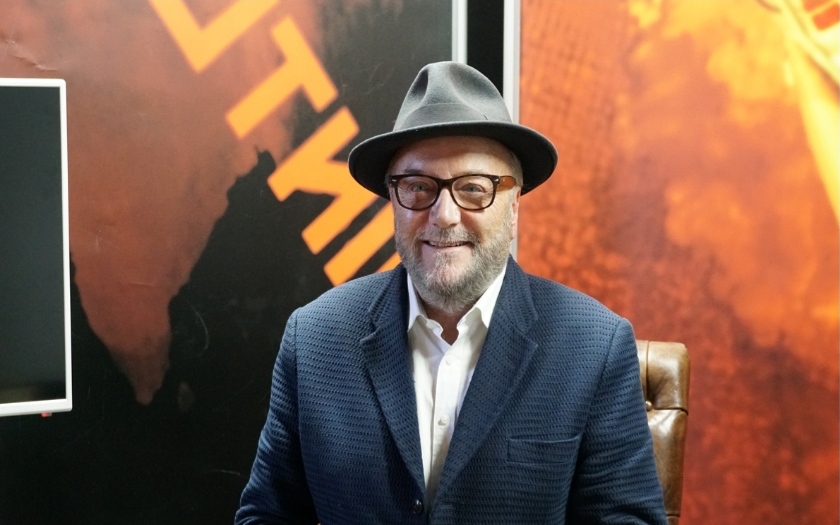US ready to fight to the last drop of Ukrainian, European blood : Former UK MP
“The working class of Europe and North America will pay the price of the NATO crazed suicide-mission against Russia,” tweeted George Galloway (Galloway), six-term British parliamentarian. He believes the US “is ready to fight to the last drop of Ukrainian blood, in the end, it’s prepared to fight to the last drop of European blood.” Why does he say so? What’s his take on the ongoing Ukraine crisis? Galloway shared his opinions in a video talk.

George Galloway
The working class of Europe and North America will pay the price of the NATO crazed suicide-mission against Russia.” There are now energy crises in Europe and the US, with energy prices jumping, affecting ordinary people’s lives. To what extent will this restrain politicians’ behaviors?
The above aspect is not restraining the Political behaviour of the USA and Western Europe . They are gung-ho to fight to the last drop of Ukrainian blood. But the pain and suffering that will be inflicted on their own people at home – working-class people, poor people – who are already suffering a massive increase, not just in the price of energy, that’s obvious.
Gas that was 48 pence ($0.63) per term (2.83 cubic meters) this time last year is now almost 800 pence ($10.5) per therm. Begin to calculate what that will mean in domestic and manufacturing, industrial, transport, aviation, all the industries that depend on energy and on fuel. But it isn’t just the price of gas. It isn’t just the price of petrol. Because an increase in the price of both feeds into every other sector of the economy, especially in this economy, which is now ever more dependent on Deliveroo and on Amazon and on the others who deliver to you daily rather than you having to go to the shops.
But the price of food will greatly increase also not just because of increased transport costs, but because Russia’s wheat production – the largest wheat production in the entire world – is now heading east rather than west. The shortage of wheat will feed into the price of everything. Now some fools say, “I don’t eat wheat.” In fact, you do: even in a burger in McDonald’s or Burger King there is wheat. So the factories will begin to slow down. Transportation will increasingly grind to a halt. Even someone like me has to think twice now before driving anywhere. We are headed toward a petrol price of £10 ($13) per gallon (4.55 liters). Luckily for the government, we no longer calculate petrol in gallons, but the older among us certainly can do the math. If petrol reaches £10 per gallon, that effectively means you cannot really use your car at all while public transport systems are in shambles, late and expensive, and badly in need of the kind of modernization that China’s transport system has already undergone.
So my prediction is that while the governments of the West will try to blame Putin, try to blame China, many people will be loath to accept that after a little while. And in any case, even those that do accept it, are going to say: “Well, we can’t do anything about Putin, but we can do something about you.”
The US will not benefit. All of the actions and inactions of the US paint very clearly an empire in quite rapid decline.
After all, it’s only 6 months or so ago that the US had to steal out of Afghanistan, like a thief in the night, defeated by men in sandals and riding bicycles. And now we have Russia defying US power, defeating US power fairly soon, I think. The whole world is watching that. It’s only days ago that Iran landed several high-power ballistic missiles near the compound of the US consulate in Erbil, Kurdish region’s capital, in northern Iraq and the US did nothing about it, can do nothing about it. We very definitely have passed the peak of American power. Chairman Mao was distinctly premature back in the 1960s when he said that the US imperialism was a “paper tiger.” It’s not even a paper tiger now 50 years later, but it is an old and declining tiger and many of its teeth have fallen out. And there are younger, far fiercer tigers in the jungle now.
Biden announced a ban on Russian energy imports. The UK followed suit. But many other European countries expressed their concerns.
The US and UK are increasingly one country, as Oscar Wilde said, divided by a common language, but that language is now coming together. So the US and UK can be treated, at least regarded, as a single entity in world affairs.
But Europe is a different kettle of fish. They cannot stop Russian oil and gas, because they completely depend on it. And though they’ve all declared their intention to cease to be dependent on it, that will not be easy to achieve at an affordable price. It will not be quickly able to be achieved. Obviously, you can’t go in the case of Russia – close to 50 percent of your gas comes from Russia. You can’t switch that off. Where are you going to get that 50 percent from, even in volume? Never mind a price that the people can afford. It’s nearly 30 percent across the European Union as a whole. So Germany is the most acutely dependent, but the European Union is heavily dependent. That’s why they carefully exempted the banks through which the European Union countries pay Russia for their gas.
One of the great ironies is that the Nord Stream 2 has been effectively closed by the US government – though it belongs to Germany and Russia. Now, we’re dependent on Russian gas still coming through the pipelines in Ukraine. Russia is still paying Ukraine rent for pipelines that are bringing that gas to Europe, which is still buying it. That’s why I say it’s a suicide mission for the West, because even if in time, Europe can replace this Russian gas, it will do so at a price almost exponentially higher.
Having quoted Chairman Mao disapprovingly a minute ago, let me quote him approvingly: “Sometimes the enemy strives mightily to lift a huge stone only to drop it on its own feet.”
There is a difference of opinion again between Europe and the US-UK Anglo-Saxon alliance – you might throw Australia into that mix also. Europe knows that if this war escalates, if it becomes an explicit NATO-Russia war, then the exchange of battlefield and then intermediate-range nuclear weapons may not be far away. If you do the math, the battlefield and the intermediate is the European continent. It would take some escalation for this to become an intercontinental ballistic missile, thermonuclear, or hypersonic nuclear conflict. And that would bring about the end of the world.
Just as the US is ready to fight to the last drop of Ukrainian blood, in the end, it’s prepared to fight to the last drop of European blood. So Europeans want a ceasefire much more than the US does. That’s why all the talk about no-fly zones and so on, which could lead to an all-out war, comes mainly from American politicians, American media, and American-driven social media platforms.
There won’t be a ceasefire unless the minimal demands – as Lavrov put them – of Russia are met. And they are truly minimal demands. They were the implementation of a Minsk agreement, which the Ukrainian government already signed along with Germany and France, and which became the property of the United Nations Security Council. That means that NATO will be neutral – like Switzerland used to be a neutral country, not a part of any military block – and that no foreign forces or weapons will ever be situated there, and there will be a recognition of the autonomy and now the independence of the Russian-speaking, ethnically Russian, 25 percent of Ukraine’s population who live in an area let’s call it loosely the Donbass. The Crimea issue is already settled. Everybody knows that, though some pretend otherwise. These are the minimal demands that Russia has. If they were met, the war could end tomorrow.
Question is: Is Zelensky free to agree to those minimal demands? Is he free of US pressure? Is he free of the fear of being hanged by the Nazi battalions and the far-right sectors of the Ukrainian military and civil society? That’s an open question.



